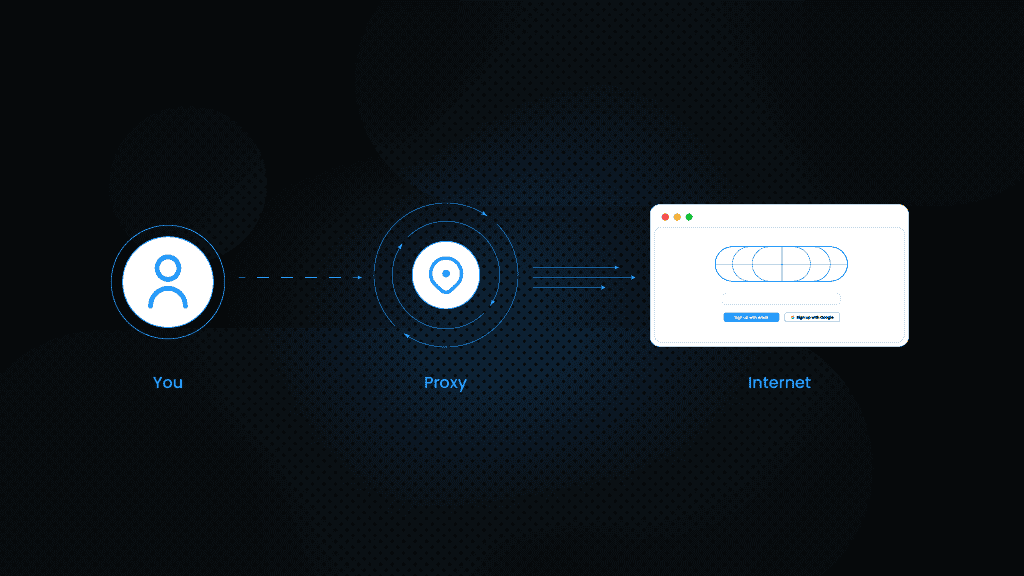What Are Rotating Proxies and Why Should You Use Them?
A rotating proxy is a server that automatically changes the user’s IP address after each connection or at set intervals. This proxy rotation is handy when you need a different IP address with every request. In this guide, we’ll explore what rotating proxies are, how they work, and their common use cases, including web scraping and multi-accounting.
What is a rotating proxy?
A rotating proxy is a proxy server that automatically switches the user's IP address after every connection or after a set period. It ensures that each connection appears to be coming from a different device or location. This dynamic IP rotation offers heightened anonymity, making it challenging for websites to detect or block the user. People use rotating proxies for web scraping, ad verification, market research, multi-accounting, and other purposes. There are three main rotating proxy types: residential, datacenter, and mobile.
Why use rotating proxies?
Rotating proxies can be handy for various use cases, including load testing, web scraping, managing multiple social media accounts, and the list goes on. There are endless possibilities where to use rotating proxies, and here are some of their benefits:
- Spreading requests over millions of IPs. The bigger the provider's IP pool, the greater the chance you have to scale your tasks by routing your requests via different IPs.
- Overcoming blocks and CAPTCHAs. Rotating IP addresses for each request lowers your chances of getting banned from the targeted sites.
- Improving anonymity and security. Constantly changing your IP makes it harder for anyone to track you down. Rotating proxies become your shield against various attacks.
How does IP rotation work?
IP rotation does a simple yet vital thing – it assigns a new IP for every request you make. Rotating proxies are highly effective for simulating large numbers of real-time connections from different users. By choosing rotating proxies, you can send thousands of connection requests and be sure that the server rotates IPs every time.
If you're running some tasks that require keeping the same IP longer, you can use sticky sessions. With Smartproxy’s proxies, you can keep the same IP for 1, 10, 30, or 60 minutes, or set a custom duration of up to 24 hours, depending on your needs.
Our rotating proxy service has convenient backconnect nodes for the whole pool or location-targeted IP pools. For instance, you can use thousands of residential US proxies by connecting to a single backconnect node for US-targeted IPs. According to the same logic, you can reach any country, state, or city worldwide. To learn how to deal with endpoints, read our short explanation with examples.
The main rotating proxy IP types
You can equip three main types of rotating proxies: rotating datacenter proxies, rotating residential proxies, rotating mobile proxies, and rotating ISP proxies. Here's what you should know about each of them:
- Rotating datacenter proxies are IP addresses provided by data centers. They're fast, reliable, and affordable, making them popular for eCommerce market research, SEO research, browsing the net, and adding an extra layer of security. These proxies are best for users who need a large number of IP addresses and don’t require precise geo-location targeting.
- Rotating residential proxies come with IPs from real desktop and mobile devices that are connected to local networks. They're a bit slower than datacenter proxies, but they make up for it with their precise geo-location targeting and can be used for a wider range of cases like web scraping, multiple account management, ad verification, price comparison, and much more.
- Rotating mobile proxies assign IPs from mobile devices connected to cellular networks. Although they're a pricier option, they have the highest success rate among all proxy types and have a near-to-zero chance of getting detected by even the most sophisticated anti-proxy software. Mobile proxies are great when managing multiple eCommerce or social media accounts, running ads, testing apps, power automation tools, or simply browsing the web.
- Rotating ISP proxies are IP addresses provided by Internet Service Providers (ISPs). They combine the authenticity of residential IPs with the stability of datacenter IPs, offering an advantageous solution for users running traffic-intensive tasks or accessing well-equipped websites with anti-bot software. They’re excellent for managing multiple accounts, eCommerce market research, SEO research, browsing, and more.
How to use rotating proxies?
Using rotating proxies is straightforward, but there are a few key steps and considerations to ensure you're set up for success.
- Choose a reputable provider. Ensure the provider offers reliable proxies with good uptime and a large IP pool.
- Set rotation settings. Configure how often your IPs rotate – either per request or at set intervals.
- Copy the proxy endpoint. Get the provided proxy endpoint and use it for seamless IP rotation.
- Integrate with your code. Add the proxy details to your script or tool.
- Monitor performance. Keep an eye on proxy speed and success rates to avoid issues.
- Rotate smartly. Choose a rotation frequency that matches your use case, avoiding suspicious patterns.
At the end of the day, the most important decision you have to make here is to select a proxy provider that won’t let you down. Without a quality provider, even the best setup can fall short, so make sure you invest in one that offers strong performance and consistent service.
The best rotating proxies
Looking for effective yet affordable rotating proxy services? We hear you and have solutions that work wonders. Our proxy pool comprises 65M+ rotating residential, mobile, datacenter, and ISP proxies. Here’s how our offering stands out from the competition:
- Our residential rotating proxies' average response time is one of the best in the industry – <0.5 seconds, according to Proxyway's research.
- Datacenter proxies are responding even faster, at <0.3 seconds, according to our speed test, and you can choose Pay per IP or Pay per GB plan options.
- Proxyway’s research shows that Smartproxy residential IPs have the best IP reputation and one of the highest success rates in the market – 99.68%.
- Our Pay As You Go option lets you buy as many residential and mobile proxy GBs as you need without a subscription.
- Our pool of 10M+ mobile proxies has the highest success rate in the industry (99.48%), over 700 mobile carriers, iOS and Android filtering, and other advanced features.
- Shared ISP proxies from premium ISP and ASN providers with a rapid response time of <0.3 seconds.
In a nutshell
Rotating proxies are an excellent solution, considering how much time and effort they can save you. If you're ready to optimize your IP rotation process, check out our best value offers for residential, mobile, datacenter, and ISP proxies. And if you still have any questions about how proxies work or the best tools for your use case, drop a line to our always-online tech support team.
About the author

Dominykas Niaura
Technical Copywriter
Dominykas brings a unique blend of philosophical insight and technical expertise to his writing. Starting his career as a film critic and music industry copywriter, he's now an expert in making complex proxy and web scraping concepts accessible to everyone.
Connect with Dominykas via LinkedIn
All information on Smartproxy Blog is provided on an as is basis and for informational purposes only. We make no representation and disclaim all liability with respect to your use of any information contained on Smartproxy Blog or any third-party websites that may belinked therein.











